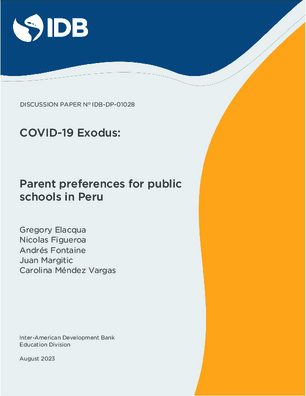COVID-19 Exodus: Parent preferences for public schools in Peru
Date
Aug 2023
In 2020 in Peru, the Ministry of Education (MINEDU), in response to the COVID-19 pandemic, organized a centralized assignment mechanism that allowed thousands of students at multiple levels of education to move from the private sector to the public sector due to an unprecedented rise in demand. Exploiting the randomness in the assignment of students to their new schools, we causally estimate which public school characteristics families that had decided to study in the private sector before COVID-19 value the most and how preferences for school attributes change after parents experience public schools. We find that families care about the distance to the assigned school and the relative academic and peer quality with respect to their school of origin. Parents weigh features such as distance to school and peer demographics differently when deciding whether or not to remain at the assigned school. These findings provide insights into how governments can strengthen the supply of public schooling.




